Search
Search Results

Article
Bronze Age Sicily
The Bronze Age in Sicily, considered one of the most important periods of the island's prehistory, witnessed the establishment of a unitary and in some ways artistically vibrant culture. The three main phases of the period take their name...

Definition
Villanovan Culture
The Villanovan culture flourished during the Iron Age in central Italy from c. 1000 to c. 750 BCE. It was a precursor of the Etruscan civilization, although the two populations are actually the same and the term Villanovan should not imply...
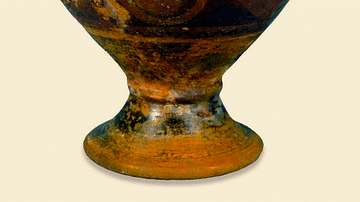
Image
Celtic Pottery Vessel
A Celtic pottery vessel from La Marne, France. It shows typical Celtic design features with its curvilinear shape and motifs in black on a red background. 4th century BCE. Height: 30 cm. (British Museum, London)
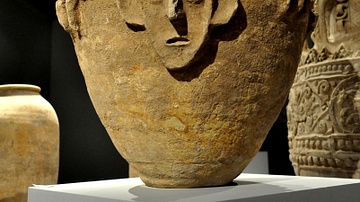
Image
Pottery Basin from Akkadian period
This large pottery basin was decorated with a human face and dates back to the Akkadian period, 2350-2156 BCE, Mesopotamia, Iraq. (The Sulaimaniya Museum, Iraq).
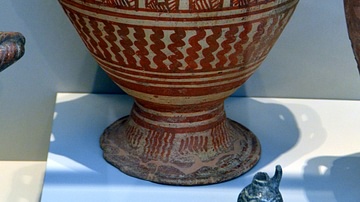
Image
Etruscan Red on White Pottery Vessel
An Etruscan red on white slip pottery vessel from Vulci or Bisencio, c. 700 BCE. (Antikensammlung Berlin)
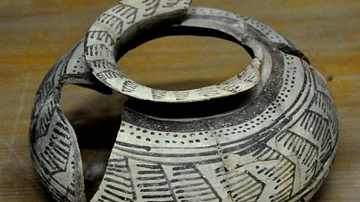
Image
Painted Pottery from the Samarra Culture
This partially broken painted pottery dates back to the Samarra culture, Mesopotamia, 6th millennium BCE. (The Sulaimaniya Museum, Iraq).
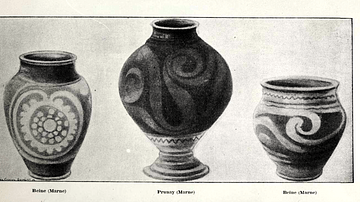
Image
Celtic Pottery Vessels, Marne, France
Three Celtic pottery vessels from La Marne, France. They shows typical Celtic design features with their curvilinear shapes and decoration. 4th century BCE. (British Museum, London)

Image
Pottery Jar from Ninevite V Period
This pottery jar was handmade and painted. It is carinated and stemmed with four equidistant vertically perforated lugs on the carination. Ninevite 5 Period, 3000-2750 BCE. From Nineveh, Northern Mesopotamia, Iraq. (The British Museum, London...

Image
Pottery Jar From Badari
This is a pottery jar with black repousse. It has 2 perforated handles on its shoulder. From Badari, Egypt. Pre-Dynastic Period, Naqada III, 3200-3150 BCE. The Petrie Museum of Egyptian Archaeology, London (with thanks to The Petrie Museum...

Image
Pottery Jar with Ankh Sign
A pottery jar with three painted representations of the ankh sign with 2 arms holding 2 was scepters. From the New Kingdom of Egypt, Ramesside Period, 1292-1069 BCE.
The British Museum, London.